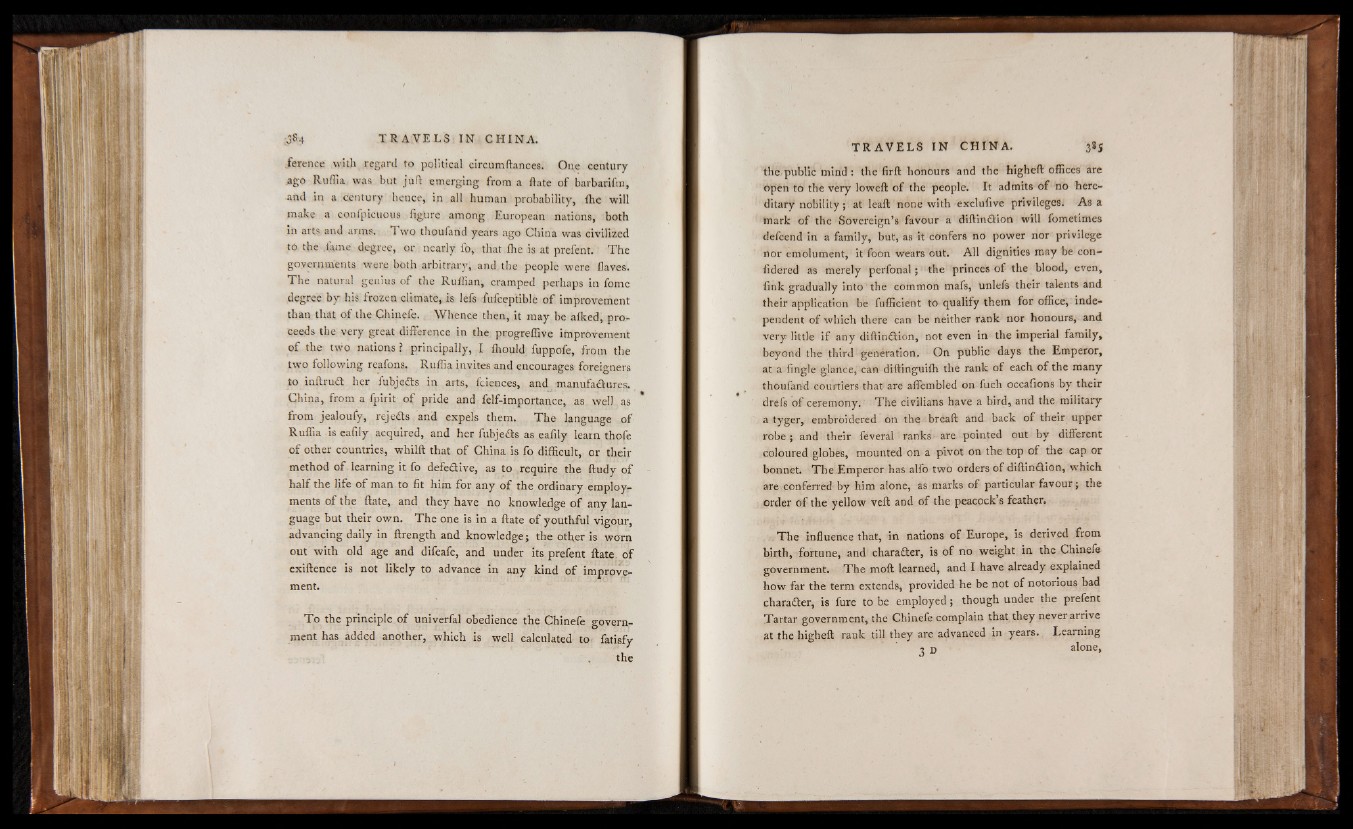
ference with regard to political circumflances. One century
ago Ruffia was but juR emerging from a Rate o f barbarifm,
and in a century hence, in all human probability, (the will
make a confpicuous figure among European nations, both
in arts and arms. Tw o thoufarid years ago China was civilized
to the .tame degree, or nearly fo, that ihe is at prefent. The
governments were both arbitrary, and the people were Haves.
The natural genius o f the Ruffian, cramped perhaps in fome
degree b y his frozen climate, is lefs fufceptible o f improvement
than that o f the Chinefe. Whence then, it may be aiked, proceeds
the very great difference in the progreffive improvement
o f the two nations ? principally, I ihould fuppofe, from the
two following reafons. Ruffia invites and encourages foreigners
to infirutf her fubjeas in arts, fciences, and manufadures.
China, from a fpirit o f pride and felf-importance, as well as
from jealoufy, rejeas and expels them. T h e language o f
Ruffia is eafily acquired, and her fubjeas as eafily learn thofe
o f other countries, whilft that o f China is fo difficult, or their
method o f learning it fo defeaive, as to require the ftudy o f
half the life o f man to fit him for any o f the ordinary employments
o f the Rate, and they have no knowledge o f any language
but their own. The one is in a Rate o f youthful vigour,
advancing daily in Rrength and knowledge; the other is worn
out with old age and difeafe, and under its prefent Rate o f
exifience is not likely to advance in any kind o f improvement.
T o the principle o f univerfal obedience the Chinefe government
has added another, which is well calculated to- fatisfy
the
the public mind: the firfi honours and the higheR offices are
open to the very loweR o f the people. It admits o f no hereditary
nobility; at leafi none with exclufive privileges. As a
mark o f the Sovereign’s favour a diflindtion will fometimes
defcend in a family, but, as it confers no power nor privilege
nor emolument, it foon wears out. All dignities may be con-
fidered as merely perfonal; the princes o f the blood, even,
fink gradually into the common mafs, unlefs their talents and
their application be fufficient to qualify them for office, independent
o f which there can be neither rank nor honours, and
very little if any diflindtion, not even in the imperial family,
beyond the third generation. On public days the Emperor,
at a fingle glance, can diftinguifh the rank o f each o f the many
thoufand courtiers that- are affembled on fuch occafions by their
drefs o f ceremony. The civilians have a bird, and the military
a tyger, embroidered on the breafl and back o f their upper
ro b e ; and their feveral ranks are pointed out by different
coloured globes, mounted on a pivot on the top o f the cap or
bonnet. The.Emperor has alfo two orders o f diffindtion, which
are conferred by him alone, as marks o f particular favour; the
order o f the yellow vefl and o f the peacock s feather.
The influence that, in nations o f Europe, is derived from
birth, fortune, and charadter, is o f no weight in the Chinefe
government. The moR learned, and I have already explained
how far the term extends, provided he be not o f notorious bad
charadter, is fure to be employed; though under the prefent
Tartar government, the Chinefe complain that they never arrive
at the highefi rank till they are advanced in years. Learning
2 d alone,